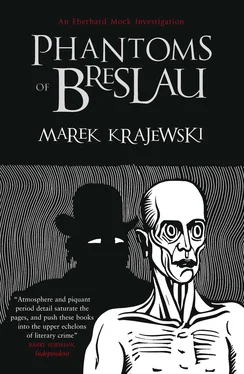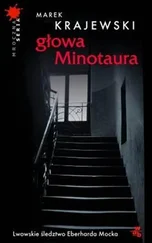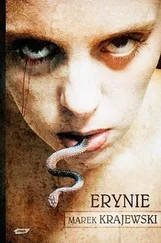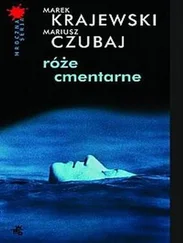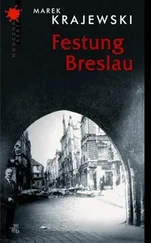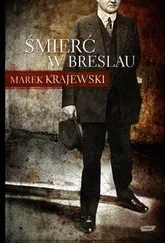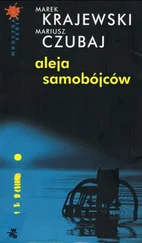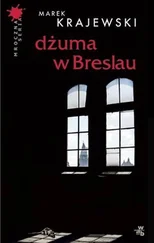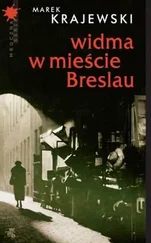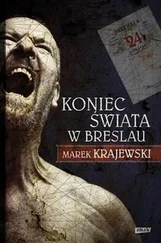Marek Krajewski - Phantoms of Breslau
Здесь есть возможность читать онлайн «Marek Krajewski - Phantoms of Breslau» весь текст электронной книги совершенно бесплатно (целиком полную версию без сокращений). В некоторых случаях можно слушать аудио, скачать через торрент в формате fb2 и присутствует краткое содержание. Жанр: Полицейский детектив, на английском языке. Описание произведения, (предисловие) а так же отзывы посетителей доступны на портале библиотеки ЛибКат.
- Название:Phantoms of Breslau
- Автор:
- Жанр:
- Год:неизвестен
- ISBN:нет данных
- Рейтинг книги:3 / 5. Голосов: 1
-
Избранное:Добавить в избранное
- Отзывы:
-
Ваша оценка:
- 60
- 1
- 2
- 3
- 4
- 5
Phantoms of Breslau: краткое содержание, описание и аннотация
Предлагаем к чтению аннотацию, описание, краткое содержание или предисловие (зависит от того, что написал сам автор книги «Phantoms of Breslau»). Если вы не нашли необходимую информацию о книге — напишите в комментариях, мы постараемся отыскать её.
Phantoms of Breslau — читать онлайн бесплатно полную книгу (весь текст) целиком
Ниже представлен текст книги, разбитый по страницам. Система сохранения места последней прочитанной страницы, позволяет с удобством читать онлайн бесплатно книгу «Phantoms of Breslau», без необходимости каждый раз заново искать на чём Вы остановились. Поставьте закладку, и сможете в любой момент перейти на страницу, на которой закончили чтение.
Интервал:
Закладка:
“What happens” — Smolorz had become exceptionally talkative — “if Muhlhaus wants to question her himself?”
Mock was staring at Erika. She shivered as the clock in the hall struck three times. The shivering did not subside, even though she was wrapped in an eiderdown. He looked at the nurse’s starched housecoat, at Smolorz, who was unhealthily excited, and then came to a decision.
“If Criminal Commissioner Muhlhaus wants to question the witness, Miss Erika Kiesewalter, he’s going to have to put himself to the trouble of going to the seaside.”
RUGENWALDERMUNDE, TUESDAY, SEPTEMBER 9TH, 1919
NOON
Erika clenched her teeth. A moment later she sank slowly down onto Mock and snuggled her face between his neck and collarbone. She was breathing heavily. Mock swept the damp hair from her temple. Gradually her numbness passed and she slid from the man onto the tangle of sheets.
“It’s a good thing you didn’t cry out,” he said, barely able to control the shaking in his voice.
“Why?” she asked in a whisper.
“The receptionist didn’t believe we were married. He didn’t see any wedding rings. If you had yelled out that would have just confirmed his suspicions.”
“Why?” she repeated drowsily, and closed her eyes.
“Have you ever seen a married couple not leave their bed for fifteen hours?”
There was no reply. He got out of bed, pulled on his long johns and trousers, then stretched his braces and let them go. They slapped loudly against his naked torso. He whistled the well-known song “Frau Luna”, opened the window that gave onto the sea and breathed smells which transported him to the Konigsberg of his past, when nobody demanded he admit to some nameless offences or blackmailed him with eyeless corpses. The waves beat hard against the sun-baked sand and the two piers built on mounds of vast boulders. As he gazed at these constructions which embraced the port like a pair of arms, Mock tasted microscopic salty drops on his lips. From the nearest smokehouse wafted an aroma which set this fanatical lover of fish quivering nervously. He swallowed and turned towards Erika. She was no longer asleep. The slap of his braces had evidently woken her and she was resting her head on her knees, staring at him. Above her head hung a model of a sailing yacht which swayed in the salty breeze.
“Would you like some smoked fish?” he asked.
“Yes, very much,” she smiled timidly.
“Well, let’s go then,” Mock said as he buttoned up his shirt and tried on the new tie Erika had chosen for him in Koslin the previous day.
“I don’t feel like going anywhere.” She got out of bed and, stretching after her short nap, ran several paces across the room. She put her arms around Mock’s neck and with slender fingers stroked his muscular, broad shoulders. “I’m going to eat here …”
“Shall I bring you some?” Mock could not resist kissing her and gliding his hand over her naked back and buttocks. “What would you like? Eel? Plaice? Salmon, perhaps?”
“Don’t go anywhere.” She moved her lips towards his. “I want eel. But I want yours.”
She clung to him and kissed him on the ear.
“I’m afraid,” Mock whispered into her small, soft lobe tangled in a net of red hair, “that I might not be able … I’m not twenty any more …”
“Stop talking,” she rebuked him in a stern voice. “Everything’s going to be fine …”
She was right. Everything was fine.
RUGENWALDERMUNDE, THAT SAME SEPTEMBER 9TH, 1919
TWO O’CLOCK IN THE AFTERNOON
They left the Friedrichsbad Spa House Hotel holding hands. Two droschkas and a huge double-decker omnibus with a metal sign announcing its route between Rugenwalde and Rugenwaldermunde were parked in front of the porch of this massive building. Not far from the hotel stood a group of primary-school children and a bald, stout teacher who, as he fanned himself with his hat, was telling his charges that during the Napoleonic wars Prince Hohenzollern himself had taken the waters at this spa; the corpulent preceptor made use of his finger and pointed to a name plaque attached to the wall. Mock also noticed a pretty girl sitting alone on a bench outside the spa house, smoking a cigarette. He had worked long enough in the Vice Department to be able to indentify her profession.
They passed several houses on Georg-Buttner-Strasse and stopped at an ice-cream parlour. Erika attacked her icy column of raspberry scoops like a child and, much to Mock’s surprise, even bit into it, the very idea of which made his own teeth ache. The rasping of a barrier announced that the raised bridge had now been lowered. They crossed it and found themselves on Skagerrak Strasse. They followed the left side of the street and entered the first house on the corner, a tavern. Mock asked the innkeeper, a Mr Robert Pastewski — this was the name that appeared above the entrance — for a dozen Reichsadler cigarettes for himself, and the same number of English Gold Flakes for Erika.
The strength of the burning September sun was tempered by a wind coming from the sea, which entangled Erika’s hair as she stood on the narrow pavement.
“I’m hungry,” she complained, and looked meaningfully at Mock.
“But …” — Mock was troubled — “we’d have to go back to the hotel …”
“I’m not speaking in metaphors now.” The wind tossed a strand of hair into her eyes. “I really do want to eat.”
“Then we’re going for some real smoked eel,” he said. “But I’ll buy you a roll first. Let’s go …”
He stepped into a nearby bakery and was enveloped by the smell of warm bread. The only customers in the place were two sailors, who were leaning on a counter decorated with starched tapestries and talking to the fat baker. They were speaking so fast in a Pomeranian dialect that Mock could hardly understand what they were saying. But one thing he did know: neither of them was buying anything, and the baker was not paying the slightest attention to him. Mock felt a vague unease, but could not get to the root of it. “It’s the two sailors, no doubt,” he thought to himself, “not four but two.”
“And what would the esteemed gentleman like?” the baker asked in a strong Pomeranian accent.
“Two doughnuts, please. What’s the filling?”
“Wild rose jam.”
“Fine. Two please.”
The baker took his money, handed him a paper cone of doughnuts and went back to his conversation with the sailors.
“Listen, Zach,” Mock heard one of them say as he was on his way out. “Who was that?”
In response he tinkled the bell above the door and glanced at Erika, who seemed bored. With the tip of her shoe she was drawing some figures in heaps of sand scattered across the uneven pavement. Mock handed her the cone and absentmindedly erased the mysterious annotations with his shoe.
“ Noli turbare circulos meos ,” †Erika said, pretending to take a swing at him; instead she stroked his clean-shaven cheek. At that moment he recognized the source of his anger.
“What am I supposed to say,” he thought as he walked beside her in silence. “I’m supposed to ask her where she knows that sentence from, and whether she went to secondary school, but every idiot knows it, after all. It doesn’t prove she’s educated or well read. ‘I’m a hetaera,’ she said to me when I asked about her profession; she uses the concept of a ‘metaphor’ correctly and quotes Cicero. Who is this whore, this crafty little whore? Maybe she wants me to start asking her about her past, her parents and her siblings; maybe she wants me to feel sorry for her and hug her. And she’s putting me to the test. Delicately and subtly. First she ruts like a she-cat in heat, then she quotes sentences in Latin which must be rattling around somewhere in that head of hers, which must be as good as empty with all this debauchery. ‘I partake in debauchery,’ she said. I wonder if she did the same way as that cripple — with three at a time.”
Читать дальшеИнтервал:
Закладка:
Похожие книги на «Phantoms of Breslau»
Представляем Вашему вниманию похожие книги на «Phantoms of Breslau» списком для выбора. Мы отобрали схожую по названию и смыслу литературу в надежде предоставить читателям больше вариантов отыскать новые, интересные, ещё непрочитанные произведения.
Обсуждение, отзывы о книге «Phantoms of Breslau» и просто собственные мнения читателей. Оставьте ваши комментарии, напишите, что Вы думаете о произведении, его смысле или главных героях. Укажите что конкретно понравилось, а что нет, и почему Вы так считаете.
